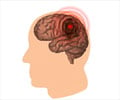An Australian researcher says that a new treatment, called the Lee Silverman Voice Treatment, may prove effective in curing speech disorder in people who have suffered a stroke or brain injury.
An Australian researcher says that a new treatment, called the Lee Silverman Voice Treatment, may prove effective in curing speech disorder in people who have suffered a stroke or brain injury.
Dr Rachel Wenke, from University of Queensland (UQ), has shown that the treatment may be helpful for dysarthria patients suffering from stroke and traumatic brain injury (TBI).Dysarthria is a speech disorder, which negatively affects a person's ability to communicate as he/she can be difficult to understand due to sounding as though he/she slurred.
The program was aimed at assisting Parkinson's patients, and Wenke is the first to trial the method's effectiveness in a group study involving other neurological conditions.
"This research will also help to provide speech pathologists evidence for treatments for the disorder, which may also encourage further research in the area," she said.
In the study, the researchers enrolled 26 participants ranging from 18 to 88 years who had experienced stroke and TBI and compared the efficacy of the new treatment with traditional dysarthria therapy.
It was found that participants displayed positive effects of a louder and clearer voice and slower rate of speech after receiving the treatment
Advertisement
"For instance, after receiving the treatment, one participant reported that the quality of his relationship with his wife had actually improved because his wife could now understand him, whereas before treatment, they would hardly communicate," said Wenke.
Advertisement
Source-ANI
LIN















